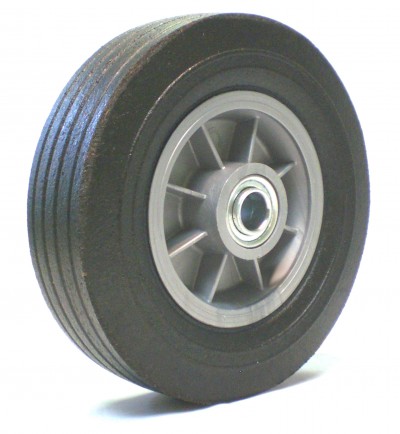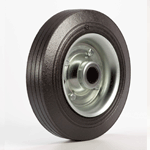Casters & Wheels

Rubber Caster Wheels
Rubber wheels are available with different hub materials and different hardness of rubber. The combination of hub material and rubber material determine the weight that the rubber wheel can hold and the properties of the rubber wheel. For example, a softer rubber wheel provides more “shock absorbance” while a harder rubber wheel may be able to carry a greater weight load or it may be easier to move than the soft rubber wheel.
(Note that for many non-industrial applications, and some industrial applications, many casters now use thermoplastic rubber wheels. Sometimes called TPR wheels, they will not mark the floor and have other properties that have become more favorable versus true rubber).
For years, many Industrial applications have used moldon rubber wheels. The moldon rubber provides quiet operation and absorbs shocks. Aluminum hubs provide a light-weight wheel compared to a moldon rubber wheel with a cast iron hub.

Types of Rubber Wheels
- crowned rubber wheels on aluminum
- hard rubber wheels
- heavy duty mold-on rubber wheel
- moldon rubber wheels on aluminum
- moldon rubber wheels on cast iron
- pressed on rubber wheels
- pneumatic rubber wheels
- rubber wheels
- solid rubber wheels
- soft rubber wheels
- thermoplastic rubber wheels
Solid rubber wheels, light to medium duty rubber wheels, and thermoplastic rubber wheels are used on a variety of general purpose carts, material handling carts, dollies, maintenance carts, office equipment and computer equipment.
Heavy duty rubber wheels and moldon rubber wheels are typically used in industrial applications that require greater weight bearing capacity. The rubber wheels provide quiet operation and protects both the load and the floor. Many rubber wheels have a hardness of approximately 70 shore (A) durometer. To decrease roll resistance, you may want to increase the hardness of the rubber wheel to approximately 90 A, or choose a crowned tread, or choose a larger diameter wheel, or choose a combination of these factors to give your wheel the overall properties that you desire.
To order, or for technical assistance, call 1-800-733-4758 and we will be glad to help you.
